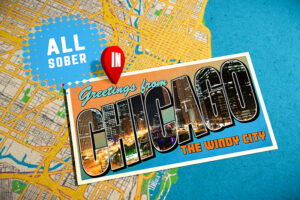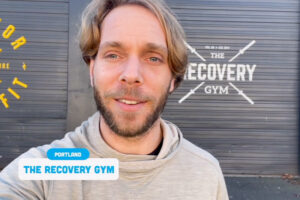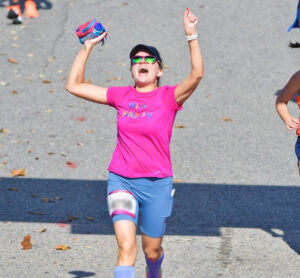Recovery Roundtable: How Do I Handle the Holidays Sober?
We turned to eight diverse voices in the recovery world — from treatment center coordinators to a Rock & Roll Hall of Famer — for tips on how to make the most of the most wonderful time of the year, sober
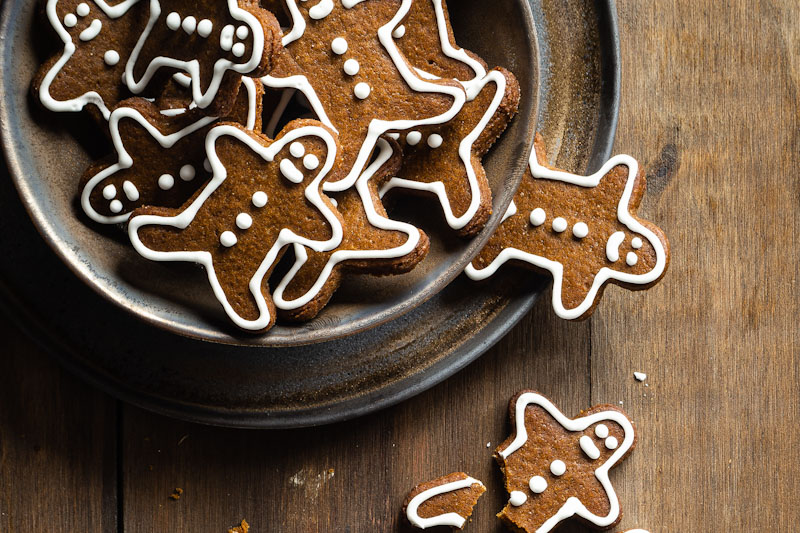
Eggnog, cider, “Christmas cheer,” Champagne toasts, ugly sweater parties, awkward uncles, canceled flights — it’s all enough to drive you a little bonkers if you’re trying to navigate the holidays sober.
But the holidays don’t have to put extra strain on your sobriety, if you go in with a bit of preparation and support. We turned to eight diverse voices in the recovery world for tips on how to make the most of the season, sober. They offered a wealth of ideas, from making holiday party exit plans to journaling out your feelings to inviting over a friend in recovery who has no place of their own to go.
Here are their pointers for handling the holidays in recovery, in the first installment of our Recovery Roundtable series! (Responses have been edited for length and clarity.)
All Sober: How do I navigate the holidays sober? What do you do?
Beau Malatesta | Director of development, Ashley Addiction Treatment, Havre de Grace, Maryland

I’ve got a few tips that I usually go to for holidays. The first one is that meetings and support groups are always available. AA meetings are available 24/7 online, so that’s huge. If you’re struggling with anxiety or stress over the upcoming holidays, jump on a meeting and talk about it. Talk about the anxiety of going to your mother-in-law’s house for Thanksgiving. Other people relate, and hopefully some of that anxiety will dissipate.
If you go to a holiday party, it’s always great to have your own ride. And if possible, have a sober partner. I think I was two years sober when I finally attended an evening before Thanksgiving party. I was offered a beer three times, and I got uncomfortable pretty quickly. So I left. But knowing that’s OK — people are going to see you, and when you leave, they’re not going to remember. Because most likely, you’re not at the top of their mind like you think you are.
I know that family members, especially in the first couple years, walk on eggshells around you to make sure that you’re comfortable. That usually heightens the uncomfortability. So just being open and talking about it upfront, you know, “Hey would it be OK if you guys didn’t drink wine at dinner this year?” or “I’m OK if you have a glass of wine at dinner this year.”
At Ashley, we have a patient holiday party where we do a white elephant gift exchange with 100 patients. After our first year of doing this, one of the patients who was there made a $5,000 donation the next year so that we can continue to do that every year. We try to make patients feel special for the day, because we know they’re missing their families.
Ricky Byrd, CASAC-T, CARC | Former guitarist with Joan Jett & the Blackhearts, Rock & Roll Hall of Fame inductee and recovery coach; recent solo albums include Sobering Times and Clean Getaway
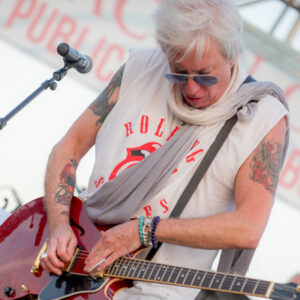
I just celebrated 35 years in recovery, so I react to things differently now than I did at the beginning of my journey. Still, I make sure to put up guardrails so I can handle whatever needs to be handled. I break out the tools I’ve collected in those 35 years.
Obviously holidays can be a trigger. Family situations where you might be around people that push your buttons. Or not having family around, for whatever reason, can bring on loneliness and perhaps guilt for awkward situations you might have played a part in. Either way my suggestion to newcomers would be to absolutely stay connected to your recovery support system. If you don’t have one, get one: Phone numbers, community support, group meetings, etc.
We can take our recovery wherever we go, and if you can, invite someone in recovery who has no place to go to join you. Strength in numbers.
I still like to go to holiday meeting marathons. Some places have meetings around the clock during the various holidays; for example, from Christmas to New Year’s. Your recovery is in your hands, and you need to chase it like you chased your “get high” — whatever that was.
Kristina Canfield, M.Ed. | Executive director, Association of Recovery in Higher Education (ARHE), which supports and helps develop collegiate recovery programs nationwide

This can be a tough one, especially depending on our relationships with family members. I know that my first holiday season in recovery was rough, to say the least! Having a list of local recovery groups was really helpful. I also kept those important phone numbers of supportive people close at hand.
I never hesitated to excuse myself for some fresh air if I was uncomfortable. It’s OK to recognize when a situation may be too much and make the decision to protect my recovery and my sanity, and make an exit. Just because I may be with family doesn’t mean I have to plant myself in situations that are risky.
Over the years, I have also worked to make my own holiday traditions, and that has been amazing.
Mindy Davey | Singer-songwriter who channels recovery, empowerment and faith into her music

I had to make sure that who I was around during the holidays wouldn’t jeopardize my sobriety. I always made sure I was surrounded by people who were good influences for me. Any bad influences that impacted me in any negative way I removed from my life.
Setting boundaries for myself was essential for my sobriety. I’ve learned that I can be in control of my surroundings, the people I hang out with, the places I go.
By being in control of that, I was able to avoid any negative situations and feel safe, surrounded by people that will be a positive influence on my sobriety and life.
Ian Jackson, LPC-MHSP, NCC | Clinical director, Recovery Unplugged Treatment Center, Brentwood, Tennessee
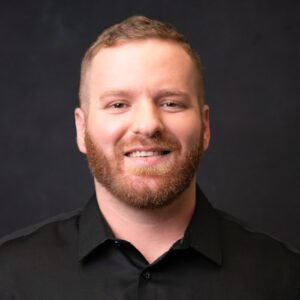
When going into the holiday season, it is important to prepare in a way that will set you up for success. What that means is looking at your schedule of events and making sure to have the proper tools in place to be able to be safe at those events.
What that might look like: If you are going to a family event where relationships have been broken or you have not spoken to someone in quite a while … break the ice! Shoot a text or a call to some of these people before seeing them to lighten the load of how it will be when seeing them for the first time.
Also, it is very important to speak up to your support system and let them know about any discomforts you may be facing going into the holidays, so they know how to support you and what type of support you need. DO: Speak up to your supports, prepare yourself for what you are facing and have a plan of action/nonaction. DON’T: Don’t shove your emotions down, don’t put yourself in a situation that you know is very unsafe, and don’t try to do it alone!
Chelsea Dueitt | National partnerships manager at The Phoenix, a sober active community with group events and classes, ranging from yoga to rock climbing, in 36 states
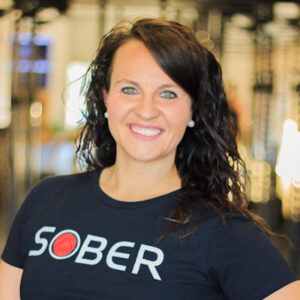
The holidays can be tricky for a lot of folks in recovery. Sometimes there are family dynamics that are uncomfortable, or maybe there are members of your family who drink and use, or are unhealthy to be around.
In any situation, the most important tip for the holidays is to have an accountability partner. When I say accountability partner, I mean someone to talk to about the different experiences we may have during the holidays. When I was in treatment, I was taught to “play the tape out,” and that’s exactly what I do with my accountability partner: I walk through the different feelings and actions I may experience during the holidays and devise a plan for how to handle those feelings and experiences.
In early recovery, the holidays were harder for me. Now, with nearly 10 years clean and sober, I feel extremely grateful that I did the work in early recovery to set myself up for success in the years to come.
Chas Smith, aka Colicchie | Hip-hop artist who raps unflinchingly about addiction, recovery and mental health

Holidays really used to bother me, particularly New Year’s, the Fourth of July and St. Patrick’s Day. Those are the ones where I used to go on Facebook and see everyone drinking.
But today, I don’t really stay around people who are drinking or using. My fiancée is in recovery, and everyone around me is either in recovery or trying to better themselves in some way.
I still go to meetings and connect with my sponsor. Staying connected with other people is the biggest thing that I do.
Sarah Gilman, LCSW | Director of clinical services, Malvern Treatment Centers, Willow Grove Campus | Willow Grove, Pennsylvania

Holidays encompass a wide-ranging and frequently intense spectrum of emotions, the combination of which are part of every person’s personal journey — including joy, grief, warmth, loneliness, sadness, elation and many other complex emotions.
An essential foundation for remaining sober throughout the holiday season is surrounding oneself with a reliable, flexible, emotionally nurturing recovery support network. This could be family, friends, sponsors, peers from NA/AA and other loved ones. Identifying supports prior to entering a holiday festivity creates comfort, as well as assistance in having a well laid out risk-mitigation plan, with predetermined decision points on when to leave or call for support.
Another great tip is to use a sober journal prior to the holidays, to journal past experiences, what you will be doing differently, and the path you will take to develop a healthy holiday plan. Journaling about possible barriers and having a written plan that you see every day primes you to keep these decision points and new patterns ready.
Asking others for help when, and as frequently, as required, is a new survival necessity. The acknowledgement and labeling of one’s feelings is the first step, as this teaches us to externalize these feelings and not turn them inward. This simple but frequently overlooked skill has been shown to be one of the most effective steps in harm reduction.
Do not hesitate to seek treatment during the holidays if you find the stressors overwhelm your coping responses. Helping professionals are there to support the recovery process during all seasons and be a part of your recovery network.
Are you a recovery advocate or treatment professional with sobriety tips to share? We’d love to hear your insights for our upcoming Recovery Roundtable features. Get in touch!
More Lifestyle
The Joy of Baking (Sober)
Two months sober, Annie Zimmerman decided to make cookies. Now, her hobby turned passion yields fulfillment, connection and delicious soberversary cakes. Read the interview!
Sure-Bet Sober Date Ideas
Ready to get back out there? Sober dating isn't so hard. But here are a few pointers anyway, to help you find your groove.
Now Elite NFL Players, They First Tackled Addiction | News Roundup
All Sober compiles the best of the latest headlines. Here's your addiction and recovery news for the week of Feb. 19, 2024!
All Sober in Chicago
A great town for recovery, come sun, rain or snow! Check out our video guide to the Windy City's best sober options for bars, bottle shops — and even an arcade with vintage games.
All Sober in New York
The Big Apple truly has it all — including a sober bar with a "witchy vibe" and an array of enchanting non-alc cocktails. Take a peek in our video guide to the sober city!
All Sober in Portland
Oregon's cultural capital may be weird and proud, but it's sober and proud too! We scoped out the coolest sober-friendly spots in our new video guide.
Running Toward Recovery
Seeking purpose in early recovery, Annie Zimmerman rekindled an old fire with distance running — and found it carried her through some of her toughest trials in sober life.
Delicious Nonalcoholic Drinks Recipes for a Classy (or Cozy) Winter's Eve
Mixology stars Derek Brown and John deBary have refined the art of sober-friendly, zero-proof concoctions for grown-ups. They shared some favorite recipes for the season with All Sober.






